It seems I've become a bit well-known in my community as “the bacon girl.” Maybe it's because I always seem to be eating, posting pictures of, and wearing T-shirts proclaiming my love for bacon.
I'm okay with that nickname, but I have wanted to write this post for quite sometime now in order to explain my choice to consume what appears to many to be copious amounts of cured pork belly. I don't actually eat bacon EVERY day, it's just so pretty when I do that I tend to photograph it and share those photos. While I don't personally stress over or worry about whether or not I'm consuming too much bacon, some seem to question it at times. Those who question whether or not bacon is okay to eat tend to be the same people who are eating wheat or other grains at every (or nearly every) meal thinking it's a health food, but this post isn't about wheat, grains, gluten or how damaging those are to our health. Others who oppose bacon may have a much more religious approach to making appropriate food choices than I do. I consider myself to be pretty level-headed and bring a well-rounded, well-founded and practical approach to helping others make the best possible choices for themselves in a lifestyle that promotes health and is something that they can maintain on a consistent and ongoing basis.
[box]“I had a lot of bacon for breakfast today. Also had an EKG, blood work, BP-106/54. The doctor said I'm the healthiest person he has seen in years.”– Robb Wolf, author of The Paleo Solution[/box]
When teaching people how to be REAL about choosing healthy food I consistently give them the bottom line on how the food they choose works in their body to either promote health or not, but I also teach a practical approach to prioritizing choices because I understand that:
1. Knowing what the BEST choice is doesn't mean that you will always make it.
I don't think this needs much explanation, but the point here is that knowing better doesn't always = doing better. Hopefully it does 80-90% of the time (ever hear of the 80/20 or 90/10 rule sorta deal?), but to think for one second that every person who knows a lot about proper nutrition will eat following the information they know about health 100% of the time is pretty militant and rigid to me. Take one bite of food in a restaurant and you can be nearly certain you are going to be breaking your own rules. That sounds stressful. Stress is not a health-promoting factor.
2. Knowing how to prioritize a food choice is often WAY more important than just hearing “this food is bad for you, that food is good for you.”
Building on point #1, if we blindly follow rules set by someone else for us without understanding WHY we are following them, well, again, that sounds a lot like something of which I don't want to be a part: religion. Okay, the anti-religion talk isn't here to make those of you reading this who are religious feel badly about it, I am talking about it in the realm of food and nutrition. When we become so rigid about what we eat that we can't live our lives and the food rules we want to live by take the pleasure out of life because we're too stressed to know what to choose, we've failed. I can tell you this much, if I spend any amount of time dining with people who are well-educated on the topic of real/whole food nutrition who know very well how food works in the body (and I do regularly), we eat things that are against the “rules” sometimes. And we laugh about how rigid and silly people become when they get so bent out of shape about following or breaking a rule. Ugh. Live a little, will you?
3. In my experience, helping people to make changes gradually, on their own terms and as they learn they “WHYs” leads to changes to the way that they live most of the time rather than for a month here or there. While I see the value in getting people to challenge themselves in a strict way for a short period of time, say a month or so, that sounds an awful lot like a diet to me, and I am not about putting anyone on a diet. We see time and time again that diets don't work. And it's not about one versus another, it's about simply giving a person a set of rules to follow and setting them up for failure versus teaching them how to make choices that will support the goals that they have day in and day out. That said, if a person is struggling with a medical issue like an autoimmune condition or really needs to see some faster results to convince themselves that the foods they are eating are not helping them to reach their goals, well then okay, go hard on yourself for a month and see where that gets you.
4. Instilling a fear of food in people or demonizing a food (pork, for example) is not my goal. Sure, I will put things like canola oil or gluten on blast, and I do so based on the science of how those foods work in the body or the process by which they are produced, but I don't think that scaring people away from something that is often a best-choice option to fit into a lifestyle they can maintain is helpful. People can be educated on the facts and then allowed to make a choice based on what they know. I don't need to instill fear or create some hard and fast rules for people to follow. That sounds too religious to me and I am notoriously not in favor of that type of agenda.
5. The idea that a food wasn't eaten by Paleo man therefore we shouldn't eat it is a weak defense at best. This is a notion that many of you can understand and have heard tossed around the Paleo-sphere by the likes of Robb Wolf and Mat Lalonde if you listen to The Paleo Solution Podcast at all. We can't simply make broad, sweeping statements or assumptions like that, present them as truth and expect to be taken seriously. We witness the effects of that kind of nonsense daily when the topic of saturated fat comes up and people run scared from a stick of butter, an egg yolk or coconut oil. And taking the time to explore some of the conventional wisdom around WHY bacon (in this case) has been demonized will hopefully shed some light on what you'll choose for breakfast the next time you're faced with the reality of a breakfast buffet: cereal/pancakes/french toast or eggs and bacon.
6. Food is NOT the end-all-be-all of what makes a person healthy. Pleasure in life, in what we choose to eat and positive mental attitude can take a person a LONG way towards being healthy. And, while I ABSOLUTELY see the contribution that our regular daily intake of caloric material makes, I think that the joy, pleasure and contentment that comes from eating whatever it is we choose to eat is not to be dismissed.
[box]“Want a truly heart-healthy breakfast? Ditch your cereal and OJ and eat bacon and eggs instead.”– Chris Kresser, L.Ac, author of The Healthy Skeptic[/box]
And now, back to the food in question: Bacon.
Let's talk about the two biggest reasons why most people are still hesitant to eat cured pork belly.
1. The Fat in Bacon.
Won't eating fat make me FAT?
No. Though it sounds accurate, that's not how the metabolism of macronutrients works. For most people, if it's an issue of a macronutrient that's making them fat, an over consumption of carbohydrates is what will lead to fat storage in the form of adipose as this overconsumption has a direct effect on the amount of insulin released in that person. The high levels of insulin (a storage hormone) running through our bodies with a relatively low level of glucagon is largely responsible for our storage of calories into body fat. These hormones (insulin and glucagon) can be very tightly regulated by the foods we eat with some exceptions (e.g.: Type 1 Diabetes). There is A LOT to cover on the issue of why simply eating fat doesn't make you fat, too much to explain in this post, unfortunately. If you want to take the time to learn about why eating fat doesn't make you fat, you can do any or all of the following:
- read “Good Calories, Bad Calories” or the slightly less dense “Why We Get Fat and What to Do About It,” both by Gary Taubes
- check out this post on “Fats & Oils” or “There is No Such Thing as a Macronutrient Part 1 – Fats” by Dr. Kurt Harris
- attend one of my nutrition seminars or perhaps one taught by Robb Wolf
- read some basics about carbohydrate metabolism on Wikipedia or about the physiological effects of insulin here.
It's easy to understand why people are scared of fat. We've been fed a lot of misleading information on the metabolism of lipids (fat molecules in food) and fooled into thinking that eating naturally occurring forms will lead to adipose (fat on our body) accumulation. This is so very, very wrong.
Okay, but doesn't bacon contain a lot of the “bad,” saturated fat?
First of all, let's get one thing straight right now: (naturally occurring) SATURATED FAT IS NOT BAD FAT.
It is called saturated because of it's chemical structure that is a completely stable chain of carbon molecules. Saturated fat = stable fat = safe fat to consume, even when heated. In fact, many leading researchers, paleo/primal nutrition experts and generally well-educated scientists who study lipid metabolism (all of whom are mentioned and linked to within this post) will likely show you that the fat content in the diet that they eat is MOSTLY comprised of naturally occurring saturated fat from animal fat or tropical oil sources. Yes, really. Go ahead, ask them.
According to Dr. Kurt Harris,
“Under the rubric of ‘fat' we have the perfect human fuels – what I call #1 Diesel – long chain saturated fatty acids (LCSFA) like Myristic (C14), palmitic (C16) and Stearic (C18) acid as found in the milk and meat of ruminants. These are, by no coincidence, the same saturated fatty acids we humans use to store energy in our own bodies – our own internal #1 Diesel. As far as I can tell, there is no limit to the amount of this kind of fat that you can eat, as long as your protein and micronutrient needs are being met. You cannot eat “too much” saturated fat unless you are not getting enough of something else. This is just the principle of displacement, though, and has nothing to do with any toxicity of these fats as food. Of course, these LCSFAs are the very fats that, in the bizarro-world of conventional nutritional wisdom, are supposedly the most dangerous and cause heart disease and cancer. That there is no real evidence for this belief, and that LCSFA are actually one of the most healthful sources of caloric fuel, is what makes embracing them and rejecting the lipid hypothesis the lodestar of PaNu or any rational approach to diet. You can’t take the most important step in improving your diet until you do this.” (source: “There is No Such Thing as a Macronutrient Part 1 – Fats”)
We've also been told that eating fat (and primarily saturated fat) would raise our cholesterol which would lead to heart disease.
Wrong again. But conveniently enough, the idea that high cholesterol is dangerous to our bodies and that lowering it might be beneficial sells a heck of a lot of drugs. $29 billion worth each year in fact. That sounds a lot easier than, oh, I don't know, changing the LIFESTYLE factors that DO contribute to elevated cholesterol in an inflammatory environment that may be responsible for disease. Things like STRESS, smoking, drinking alcohol, consuming excess carbohydrates primarily in the form of sugar and refined foods – all of which, by the way, just create more systemic stress for your body.
According to Stephen Guyenet, Ph. D (biochemist/neurobiologist author of Whole Health Source), “When investigators analyzed the relationship between saturated fat intake, serum cholesterol and heart attack risk, they were so disappointed that they never formally published the results. We know from multiple sources that they found no significant relationship between saturated fat intake and blood cholesterol or heart attack risk… Overall, the literature does not offer much support for the idea that long term saturated fat intake has a significant effect on the concentration of blood cholesterol. If it's a factor at all, it must be rather weak, which is consistent with what has been observed in multiple non-human species.” (source: “Does Dietary Saturated Fat Increase Blood Cholesterol? An Informal Review of Observational Studies.”)
Additionally, according to Chris Kresser, La.C (author of The Healthy Skeptic),
- Eating saturated fat and cholesterol reduces the type of cholesterol associated with heart disease.
- Replacing saturated fat and cholesterol with carbohydrates lowers “good” (HDL) cholesterol, raises triglyceride levels, and increases our risk of heart disease. (source: “The most important thing you probably don't know about cholesterol.”)
But that's sort of not the point here because the majority of the fat in bacon (50%) is MONOUNSATURATED fat.
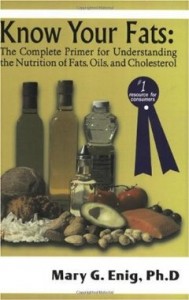
Consider reading this.
Yes, the same primary fat that you find in olive oil. Most people aren't walking around holding on to a notion that olive oil is unhealthy for them, but somehow they have been convinced that lard is. According to Dr. Mary Enig, author of “Know Your Fats,” lard “can either be a firm fat or a soft fat depending on what the pig is fed” and its fatty acid profile is usually about: 40% saturated fatty acids (SFA) 50% monounsaturated fatty acids (MUFA) 10% polyunsaturated fatty acids (PUFA). Olive oil, for the record, is usually about 16% SFA, over 70% MUFA and the remaining roughly 14% PUFA. We know that heating olive oil, or any primarily monounsaturated fats for that matter, over their smoke point causes oxidation (damage) to the oil and oxidized oils are unhealthy to consume. So while I don't generally recommend people cook with olive oil for it's high MUFA content, I don't make that exact same case against bacon fat or lard largely because, though lard is 50% MUFA, it is also 40% SFA. So joining the the less stable fat in the lard is a highly stable saturated fat versus in olive oil where the ratios highly favor the less stable MUFA. That said, I don't recommend using and re-using the same bacon fat or lard over and over to the point where it will become damaged or oxidized and therefore an unhealthy fat to consume. Both olive oil and lard have pretty similar PUFA content so arguing the matter there comes down to some more details related to 1) the quality of the meat you're buying and 2) the overall balance of the rest of your diet when it comes to essential fatty acids EFAs.
The EFAs: A few words on the n6:n3 ratio in pork fat.
(Okay, well a few maybe more than a few. If you know Mat, brevity is not his thing, but thoroughness certainly is!)
According to Mat Lalonde, Ph. D. in organic chemistry and all-around nutritional biochemistry geek regarding bacon, “Specifically, I want to discuss the quality of the fat. It has been shown in ruminants that the diet (grass versus grain) has a substantial impact on the levels of omega-3 fatty acids, vaccenic acid, as well as conjugated linoleic acid found in the meat. Consumption of these fatty acids has proven, substantial health benefits. The meat and milk of grass-fed animals contains more omega-3 fatty acids, vaccenic acid, and conjugated linoleic acid than the meat of grain-fed animals. Interestingly, the meat of grass-fed and grain-fed animals contained similar amounts of a short chain omega-6 fatty acid called linoleic acid. (see: A review of fatty acid profiles and antioxidant content in grass-fed and grain-fed beef. Nutrition Journal 2010, 9, 10)
So if an individual consumes meat from a grain-fed animal, particularly fatty cuts of meat, that individual is getting all of the bad fats with none of the good ones. This has an effect on the fatty acid profile of the consumer. (see: Red Meat From Animals Offered a Grass Diet Increases Plasma and Platelet n-3 PUFA in Healthy Consumers. British Journal of Nutrition, 2011, 105, 80-89) Now pigs are not ruminants, so I am making an assumption by saying that the meat of grain-fed pork will have a lower concentration of omega-3 fatty acids, conjugated linoleic acid, and vaccenic acid. Nevertheless, I feel like this is a very safe assumption.
Now, would I recommend limitless consumption of bacon that originates from grain-fed, factory-farmed pigs? No! Absolutely not! Would I recommend some consumption of bacon that originates from pastured pigs fed an omnivorous diet that does not contain grain. Yes! Absolutely! I don't think that occasionally eating bacon from grain-fed, factory-farmed pigs is bad if the consumer has an otherwise good diet.
My definiton of a good diet is one that is comprised of meat from grass-fed or pastured animals, vegetables, roots, tubers, and bulbs with limited fruit, nut, seed, and fermented dairy consumption and no grain, legume or milk consumption.“
Hear, hear, Mat!
I've been making recommendations to my readers, clients and workshop attendees about prioritizing the quality of their food choices (and ESPECIALLY sources of fats in their diet) regarding food quality first and foremost whenever possible and even created this handy PDF guide to Food Quality and how to choose what's best. I certainly don't recommend people go out and eat loads of cheap, potentially chemical-laden bacon at a time. Heck no! I've been promoting bacon from pastured pig sources from day 1 and sharing information on where I source my own bacon to every person who asks – noting the sources of pretty much all of the other meat I eat as well for that matter. I don't think I have a single reader, fan, follower, whathaveyou who doesn't know what the best kind of bacon to buy is. If they're unclear maybe it's motivation for me to create a “Start Here” page to get them up to speed. That said, would I recommend that someone at an airport, traveling or in an outside of the home dining experience eat bacon of an unknown source? Well, if it's bacon or bread, yes, I say bacon. Hands down, regardless of the source. That's how I prioritize for myself based on my education of how food works in the (and yes, primarily MY) body, and so that is what I teach to others. They can take that advice or leave it. Most of them take it.
[box]“I make no attempt whatsoever to avoid the bacon that has the nitrates in it because that's all nonsense anyway. There's no harm to eating the nitrates in bacon.”– Kurt Harris, MD – who lists bacon amongst the things he eats nearly daily.[/box]
2. The Nitrates in Bacon.
We come back to Stephen Guyenet who makes the following points about the feared compounds:
“Nitrate (NO3) is a molecule that has received a lot of bad press over the years. It was initially thought to promote digestive cancers, in part due to its ability to form carcinogens in the digestive tract. As it's used as a preservative in processed meats, and there is a link between processed meats and gastric cancer (1), nitrate was viewed with suspicion and a number of countries imposed strict limits on its use as a food additive. But what if I told you that by far the greatest source of nitrate in the modern diet isn't processed meat– but vegetables, particularly leafy greens (2)? And that the evidence specifically linking nitrate consumption to gastric cancer has largely failed to materialize? For example, one study found no difference in the incidence of gastric cancer between nitrate fertilizer plant workers and the general population (3). Most other studies in animals and humans have not supported the hypothesis that nitrate itself is carcinogenic (4, 5, 6). This, combined with recent findings on nitrate biology, has the experts singing a different tune in the last few years.” (source: “Nitrate: A Protective Factor in Leafy Greens.”)
And Mat Lalonde explains that:
“Nitrites were originally thought to be harmful because sodium nitrite or potassium nitrite can form nitrous acid under acidic conditions. In fact, the conversion of nitrite salts to nitrous acid is typically performed with hydrochloric acid, which is found in the human stomach. Nitrous acid can subsequently be converted to the nitrosyl cation under acidic conditions. The nitrosyl cation can react with amine functional groups, such as those found in amino acids and many other biomolecules, to form N-nitrosamines. The oxygen atom of the nitroso functional group can be protonated under acidic conditions, which results in the formation of a potent alkylating agent that can transfer alkyl groups to nucleophilic sites in biological molecules such as DNA. The carcinogenic activity of nicotine, for example, is due to the reaction of the tertiary cyclic amine of nicotine with the nitrosyl cation followed by ring opening. This leads to 4-(N-methyl-N-nitrosamino)-1-(3-pyridyl)-1-butanone and 4-(N-methyl-N-nitrosamino)-4-(3-pyridyl)butanal, both of which become potent methyl transferring reagents upon protonation. The reaction of nitrite salts with hydrochloric acid that I described above occurs in vitro (i.e. in a reaction flask in a laboratory fume hood). It was assumed for the longest time that the same thing would happen in vivo upon ingestion of dietary nitrate or nitrite. One should never assume that the results of in vitro experiments will be replicated in vivo or that the results of in vitro experiments have predictive power with regards to the results of in vivo experiments. The in vitro work is merely performed to justify in vivo studies.
So what happened when the experiment was performed in vivo? It was determined that nitrate was reduced to nitrite, which was reduced to nitric oxide (a.k.a. NO) via bioconversion in the entero-salivary circulation. Nitric oxide is a potent vasodilator and responsible for the blood pressure lowering effects of vegetable consumption. See: Inorganic Nitrate Suplementation Lowers Blood Pressure in Humans: Role for Nitrite-Derived NO Hypertension, 2010, 56, 274-271 and Dietary Inorganic Nitrate Improves Mitochondrial Efficiency in Humans.Cell Metabolism, 2011, 13, 149-159.
So dietary nitrates and nitrites are not problematic. If the in vivo effects of nitrates and nitrites were comparable to the effects in vitro, then consumption of vegetables would not be recommended.“
For even more information on nitrates, bacon and hot dogs you can check out this article from Chris Kresser and this article as well.
[box] “I don't think bacon is the ideal food to eat on a daily basis because of the smoking and other processing and the relatively high temperatures usually used to cook it, but the hard facts are that it is not only a good source of choline, but downright delicious and thus an important part of making breakfast or a grass-fed cheeseburger taste awesome. It is also bendable into heart shapes for a loved one. Bacon should therefore not be shunned or ignored.”– Chris Masterjohn of Cholesterol and Health & The Daily Lipid[/box]
In conclusion…
Demonizing cured pork belly for reasons that are unsubstantiated by science is dogmatic and downright reeks of conventional wisdom.
My advice to my readers, fans, clients, workshop attendees, etc. is and has always been this:
- Consider whether or not the food in question is a whole, real food from nature. If a process has been applied to it, is it one that you can recreate fairly simply in your own kitchen? In the case of bacon (cured pork belly), yes it is.
- Focus on the quality of the food you are buying and buy from local and sustainable farms who raise their animals on pasture whenever possible. By doing this you not only support your own health, but the health of the earth and a system that desperately NEEDS our support. When local/pastured isn't an option due to finances or availability, use my food quality guide to prioritize from there.
- Make choices about the food you're eating based on which will bring you the most health while carrying the fewest detrimental effects along with it. Don't compromise your digestion in order to avoid consuming an animal that may not itself have eaten a perfect diet.
- Enjoy the foods you choose to eat. If you get through each day with choices that make you feel angry, upset, deprived or disappointed, your health will suffer regardless of the quality of the food you eat. Food is not just about caloric material on a plate. Food is about things that feed us, physically as well as emotionally and spiritually.

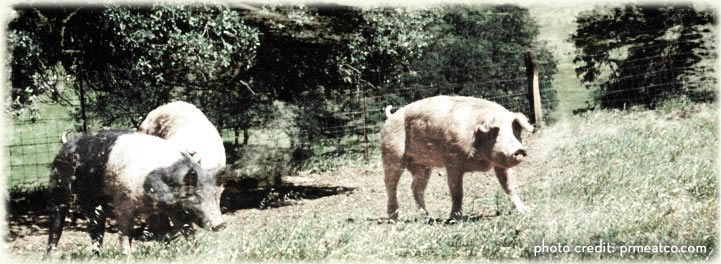
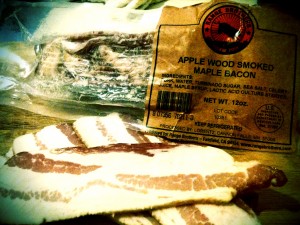
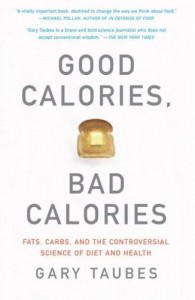



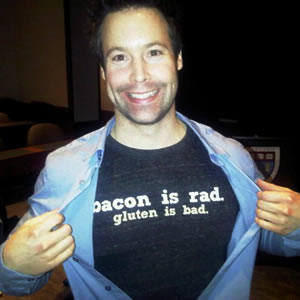
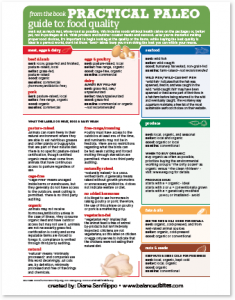
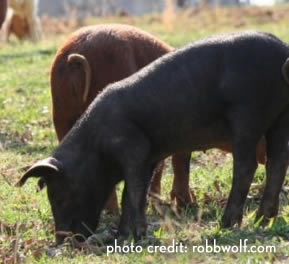

Comments 101
Excellent.
awesome post! this has actually been on my mind a lot lately. ive found a good bacon-source and have been eating a lot of it but still have that nagging CW-voice in the back of my head. thank you!
Glad this post is finally up! I have to say, your practical approach to nutrition and your coaching style resounds with me and is working in my life. Especially as someone with a history of eating disorders I appreciate your hesitancy to demonize foods which can be crazy-making. I love that you treat your clients like humans not robots. It’s working for me and helping me undo years of food baggage.
Thank you! lots of bad info going “whole around”
Epic Bacon Post! Awesome.
Thank you for bringing up the point on the pleasure of eating – that seems to be lost these days within the sub-culture of non-conventional nutrition professionals.
It’s tiring when people demonize foods (esp. bacon) and act like evangelicals – whether it’s Paleo, Peatsters or Vegans; it’s obnoxious and divisive. We need freedom from religious attitudes in nutrition circles – all it does it turn people off from exploring local/pastured foods. Some of the attitude I see creates a cult-like elitist group of ‘Paleo Commandos for Christ’. People need to go out to eat & enjoy a little more…but maybe I’m spoiled living in NYC.
In fact, ‘health’ could partially be defined by freedom from dogma & militant attitudes.
I think one of the main reasons people demonize pork (that is almost never talked about) is the influence of abrahamic religions which encourages judgment & hatred of animals & people, but pigs in particular. This influence is, IMO, behind some peoples’ unexamined demonizing pork/bacon.
If people actually spent some time with truly pastured pigs, or maybe read a book on the topic, they would know how valuable they are to small family farms.
Diane, one of your better qualities is your ability to make this info accessible to the masses by not being a militant nutritionist or a self-righteous nutritionista, so thank you. I feel comfortable linking to this & helping people see not only benefits in supporting local, farming but also keeping the pleasure factor in their eating & not be too rigid .. and of course, enjoying the awesomeness of bacon.
And, for the record… dates wrapped in bacon are unbelievably amazing. So is escargot wrapped in bacon (which I had for the first time recently) and pretty much anything you can wrap inside bacon is all pretty amazing.
And Epic Meal Time videos are some of the funniest videos on food ever.
Some people are really missing out on good food and good fun!
thanks again, this post is great!
Antonio
Great offing post. Thanks for writing it! It answered the questions I had about the nitrates in bacon. 🙂
Actually one of the possible causes of AIDS is nitrates and nitrites because amyl nitrate has the same nitrate in it that is used in processed smoked meat. I just wrote about this in my thesis on HIV. Check it out on the EPA web site. It doesn’t talk about AIDS of course, but it does say that the nitrate in drugs is the same nitrate that’s in processed foods.
Good article but I cant resist to tell you that you should have bacon “IN MODERATION” lol
HA!
{{you should have bacon “IN MODERATION” }}
That’d be just once a day?
{wink}
Really, though, why do you say “In moderation”. Where does that opinion come from? If you are of the opinion of Eades and Taubes, then fat should not be your enemy, and neither should saturated fat. So please explain your opinion.
I’m pretty sure these people are being sarcastic.
Thank you so much for this piece! Very helpful! And now I feel less dumb when I try to tell people why it’s ok that I eat so much bacon.
Thank you for this post – very timely! I love bacon. When people ask me in horror what I CAN eat after I’ve turned down the proffered gluten-filled sugar-bomb, I’m happy to say I can eat lots of bacon and steak. People seem a little jealous, too, and we often share a laugh about my crazy diet. It seems like a good way to have an infectiously positive outlook – way more fun than being vegan.
Couldn’t have said it better myself (and I tried). The unfortunate truth is that people will flock first to sources of rigid, blanket rules and the taglines under which they’re categorized before they’ll get in touch with their common sense, their innate intelligence, and their food intuition. Thanks for the reminder that food choice, enjoyment, pleasure and health are highly individual, even underneath the “Paleo” framework.
Liz…….you said it really well too 🙂
Wow, Liz- I only saw your post late today… I commented though- I think it was great 🙂 I can’t be a religious leader-type trying to create a doctrine which others should follow or risk surrendering their supreme health. Ick.
Oh. Hell. YES! Great post, Diane.
I eat far more bacon now than when I was on a “healthy” (LOL) diet with whole grains (including whole-wheat pasta and wheat crust pizza), fruit juice protein smoothies, and lean poultry/fish. I also now weigh 30 lbs. less even though I only run 1/10th as much, and all my blood test markers have improved significantly. Grass-fed burger with pastured bacon and avocado between some organic lettuce? Yes, please!
GREAT article and perfect timing. I was in the midde of reading my second blog today about this topic. 1/2 way through the second one I was distracted and didn’t get to finish. Then later in the day I was on a different computer and saw your article. I must say I will not be going back to finish the other blog I was reading. Probably ever. That blog seems to make me always feel less than perfect when I believe eating Paleo is perfect for me, even with my dark chocolate and bacon addictions.
Thank you for turning my day around. My kids eat a lot of bacon from proper sources and they love it. I was starting to worry that I was doing something wrong by feeding it to them. Transitioning older kids to Paleo is hard, but with Bacon everything seems a little bit easier.
Pineapple wrapped in bacon. it’s like candy!!!
Amazing.
You are one smart cookie Diane! This was probably one of the best blog posts from the Paleo world that I’ve read lately. Solid research and common sense advise that resonates with the masses. I love your approach to nutrition and it is the same approach that I use with my clients – demonizing foods and making people feel uber-critical/guilty for their choices is no way to promote a healthy lifestyle. Educating them and leading them at their own pace gets people much farther in the grand scheme of life.
F**king Awesome, Diane! This is great, and I will be sending a few people I know this way to read up 🙂 Thanks!
Hi Diane,
Wonderful post – and thanks for linking to my post at Robb’s site.
…Tim
Thanks for posting that recipe!
I lost 25 lbs eating bacon!
Well…I lost 25 lbs by cutting gluten/going paleo and working out 3x a week…but bacon sure helped curb my initial cravings for sweet or starchy foods.
Pizza or bacon? Pasta or bacon? Chocolate cake or bacon?
BACON WINS EVERY TIME!
Such a great post, Diane!
Thanks, Marie. And, I recognize that the point isn’t that we’re constantly putting bacon against really poor quality food choices, but the reality for MOST people who are making changes to their diet (especially early on… can you say almond-addicts?!), is that it DOES come down to bacon (or almonds) vs bread/pancakes/cereal/pastries a lot of the time. And, yes, I vote bacon every time.
Great post, thanks for bringing all this information together.
Bacon is about the only paleo thing my 15 year old daughter will eat for breakfast right not.
I’ve noticed too that pork is one meat that seems to help with weight and appetite control. Maybe be the fat ratios in it.
This was a timely post! There seems to be a growing debate in the paleo community over bacon, and nitpickers vs. whole picture folks in general. I love Balanced Bites “whole picture” approach. THIS is what is needed. When we start to nitpick and argue over cured pork belly, I find it to be problematic. Bacon is one of the healthiest foods you can eat, a great energy source and amazingly tasty! I hope this article is viewed by many!
Thanks Ben 🙂 Glad you enjoyed the post.
I just forwarded this blog post to one of my personal training clients. He has been desperately trying to spread the word about the potential dangers of consuming gluten (he has a gluten sensitivity), and that consuming bacon (and other forms of saturated fat) will not raise cholesterol levels or cause you to have a massive heart attack on the spot. This was his response back to me…
“That blog/article is fantastic. She crystallizes stuff I have rolling around in my brain from what I have learned about nutrition into a simple and easily digestible form. Thanks for sharing.”
I will continue to promote your work because it is, in my opinion, some of the best out there… along with Antonio’s (HUK), of course!
Thanks, Karina 🙂 Glad he learned something!
Great post! Bacon deserves our attention 🙂 – Personally I love bacon (and belly from any animal for that matter), but I still feel slightly conflicted from time to time about how pigs are raised in general if grain in the diet is a concern. Even if a pig is organic, raised on pasture, and allowed to eat whatever forage is available, chances are they still have significant grain, grain by products, and possibly soy in their diet. It’s not economically viable (or even an option) for a farmer to feed their pigs a completely natural diet. They would take much longer to fatten up and would be leaner (wild pigs are a lot leaner). They still have to raise that animal within a certain period of time to at least break even on the investment. Some of the best pigs I know of in Northern California are pasture raised and eat lots of natural things, but they still have grain (or other by products like whey) in their diet. I definitely take comfort in the fact that pigs are omnivores and not ruminants. Long live bacon!
Yeah, I personally don’t stress over the minutia if I am getting the best possible animal I can get. Do the best you can where you are with what you have. That’s the most anyone can expect of themselves.
I want to shake a bit the “eating fat wont make you fat” thing. It’s not quite true…
If someone is constantly overeating on fats, even on zero carb, will get fat, no question about. you cant fool thermodynamics. I know that the “eat as much as you want” jive sounds very nice but it’s based on the “as much as you want” is not too much. Overeating on anything will make you fat.
The “as much you want” is less caloric wise on fats than on carbs. Simple. On carbs, people most likely overeat. Eliminating carbs and increasing fats, they will get to satiety under their caloric budget.
Hey Mike-
For sure you can’t eat fat in extreme excess and maintain a steady weight, that wasn’t my point but thanks for bringing it up. The point was just to explain why the conventional wisdom of fat in food = body fat is misguided, know what I mean? I was one of those people who believed that if I ate fat I would get fat, and I am pretty sure I will have a lot of readers (especially new ones) who come in believing that, so that’s why I brought it up.
I think the statement “you can’t have your butter and eat bread too” is also sort of true… meaning… if you are going to work on becoming fat-fueled, you can’t also be shoving in tons of carbs or it won’t work. Additionally, yes, eating a high fat diet TENDS to leave people more easily eating fewer calories over time because of the higher satiety factor as well as the ketogenic effect of being able to USE STORED BODT FAT AS FOOD/FUEL, so needing more exogenous calories isn’t always necessary when we have food sitting in our fat pad just walking around.
MMM… adipose for dinner anyone?
I’m just a bit annoyed (can you tell?) by this “mystic” that started to go around the Paleo Diet. People should start THINKING! That’s where the problem is.
Yes, I know 🙂
Excellant report I am mostly westen a Price oriented but have given up gluten—since doing so I have raised my bone density 2 and 1/2 % I love bacon and am thrilled that nitrates are not harmful
Thanks for all the info, people often act like I am from outer space with my raw milk and bacon habit!
Jean Orinda
Rock on Jean!!!
What if you absolutely cannot afford any grass-fed meat, whatsoever? I’m new to Paleo and finding that it alone is far more expensive, forget about adding anything grass-fed.
Hey Katie-
I have a Food Quality Guide on this page of my website that I recommend you check out for all of the “next best” things.
http://blogbb.wpengine.com/useful-guides
I would also read this post on how to prioritize what you spend money on to eat paleo.
http://www.blogbb.wpengine.com/2010/10/priorities-for-eating-paleo-on-a-budget.html
It says the link to the “budget” article no longer exists?
I fixed it- that should work now
Wow, glad I found this article…pork is still one of my favorite foods! Good to know that I can still safely indulge in this tasty meat by following a few precautions. Thanks for the info! Pork is rad!
Regards,
Jared Blake
Vision Exercises
A friend sent me the link to this post, as I am the “bacon girl” in my own community, and I just wanted to thank you for saying so well what I’ve been trying to tell people for years about my bacon consumption, and then going even further and actually providing supporting documentation and information. I found it a fascinating read and even went ahead and linked to it over on my blog in the hopes that my bacon-loving friends will enjoy it and my bacon-fearing friends will get a little more educated.
Yay for bacon girls! 🙂
I want that shirt.
And some bacon.
Now.
🙂
The shirts are for sale! 🙂
http://www.balancedbites.spreadshirt.com
What about the toxicity aspect. Pigs do not sweat so is pork very toxic?
I don’t know if I understand this logic. At all.
Viva La BACON!!!!
Interesting article but of course a balanced diet is the best way to go …you can eat bacon to the extreme and still be healthy … I mean you know of the Twinkie Diet!
But really grains and gluten are a problem? unless you have a real condition of intolerance ( and I think many don’t they just eat too much) same like bacon a bit is OK.
I don’t eat bacon but that’s more because of animal welfare than anything else … like the founder of Facebook does it now …” Eat what you can kill” ..maybe that’s closer to a true Paleo
Raymond
I always promote balance, hence the name of the website 🙂 I don’t like the “everything in moderation” approach, but I am pro-balance.
Yes, grains and gluten can cause a lot of problems for a lot of people, mainly because most people DO eat too much of them. Not all, but most… it’s what we are told is healthy but people really overdo it and aren’t aware of the ramifications.
Check out this post for more info on that:
http://blogbb.wpengine.com/2010/07/is-your-gut-leaky.html
And yes, true paleo would be to kill and eat your own food, but we’re not creating a historical reenactment here, we are trying to adapt our modern lives to what may be most natural for the human animal within what we find realistic, health-promoting as well as pleasurable.
A friend of mine, on and off on a paleo way-of-eating told me that she saw recent research results (or freewheeling interpretation of results?) to the effect that nitrates/nitrites might be a very important cause of neural degeneration (Parkinson or Alzheimer or MS?) Unfortunately, I don’t have references and cannot find them.
I think it is worth investigating. However, in the view that vegetables are also sources of NO3- and NO2-, the human genome must have adapted somehow, unless the original primeval diet was not that high in vegetables (which would upset a lot of people…).
Yeah, I’d want to see the studies too. And, I agree, the value of veggies can be exaggerated by many as paleo diets may not have all included a lot of vegetation. However, in a modern world, I think they’re a good source of antioxidants and other vitamins/minerals if we can get them in. Also, they’re pretty… 🙂
Can you reply to these comments from Whole9 about nitrates/nitrites?
2. On your comment (i.e. Mat Lalonde’s comment, since you basically regurgitated his perspective) on nitrates/nitrites, there’s a little more to the story. Here’s where that little thing called “confirmation bias” comes in – you read what you want to read. Sure, nitrate/nitrite is converted to nitric oxide (NO), but that’s arguably good. If you only selected studies that support nitrate-preserved bacon, you can make yourself feel better about it. However, NO is a powerful mediator of chondrocyte (cartilage) breakdown: http://www.ncbi.nlm.nih.gov/pmc/articles/PMC3045396/pdf/1471-2474-12-42.pdf Since bacon lacks the powerful antioxidant compounds (polyphenols, etc.) that the vegetable sources of nitrates (and olive oil) would contain, it lacks the ability to partially buffer the reactive oxygen species that work with NO to drive joint degradation. So maybe nitrates/nitrites aren’t a free-for-all. Beware the confirmation bias!
Good question. Some research (like the studies that you cite) suggests that the nitrates in our diets (from vegetables) have vasodilatory effects (which is how they help to control hypertension). This is true, but there is an small asterisk next to this statement. The conversion of nitrate to nitrite to nitric oxide (that actually acts as a mediator to promote vasodilation) occurs primarily in a hypoxic/ischemic state, which – importantly – is not physiologically normal conditions. Some conversion takes place in the mouth (by anaerobic bacteria), and it will occur in tissues that are hypoxic during intense exercise or with ischemia (such as angina or a heart attack); thus, it has a protective vasodilatory effect. Like many other things, nitrite/NO may have both good and bad effects, depending on “context”. There’s a lot of research that suggests that some aspects of processed meat (heme iron, oxidized fats, potentially carcinogenic compounds, and preservatives like nitrites) might have some downsides, most of which are “offset” by a nutrient-dense diet where minerals like calcium, antioxidants, polyphenols, chlorophyll and fiber are plentiful. So it’s not just the food itself that has to be considered, it’s the dietary “context”. Which is why we say that processed meats (like bacon) are fine in moderation alongside the rest of your nutrient-dense Paleo-type diet, but in large amounts (displacing nutrient-dense veggies) on a really regular basis, they might not be the best choice.
From the abstract of the first study you referenced: “The presence of nitrates and nitrites in food is associated with an increased risk of gastrointestinal cancer and, in infants, methemoglobinemia.” Of course, association doesn’t prove causation, but we don’t completely ignore observational data simply because it’s not 100% causative. Just a thought.
One further point: nitric oxide, while promoting vasodilation, may trigger or participate in the destructive inflammatory cascade that occurs in joints (especially in cases of rheumatoid and osetoarthritis):
“Nitric oxide (NO) is a messenger implicated in the destruction and inflammation of joint tissues.” http://www.biomedcentral.com/content/pdf/1471-2474-12-42.pdf
http://rheumatology.oxfordjournals.org/content/39/9/1004.full.pdf
http://www.ncbi.nlm.nih.gov/pubmed/11709117
So nitrite-derived nitric oxide (or at least high levels of it) might not always be awesome. Just sayin’. The gist is not to argue point-for-point for or against any individual microdetail of a small component of a food. That’s what Michael Pollan calls nutritionism, and he does not use that word complimentarily (is that a word?). The point is simply that the wholesale acquittal of something (in this case, nitrate/nitrite) based on a few studies or only one perspective or an oversimplification can be misleading and might cause people to apply that perspective in a way that is not optimally healthy.
Long story/answer short: nitrate/nitrite is probably fine in amounts normally found in a healthy, highly-varied diet, but that’s somewhat dependent on the “offsetting” of other (generally plant-based) dietary factors that “soften” some of the potential downsides of the processed meats. Remember, the nitrate/nitrite issue is only PART of the issue with processed meats. But… you didn’t ask about that, did you? 😉 Thanks for the good question.
Hi Alex- Unfortunately I don’t have time to adequately respond to those comments right now as I am head-down in the books wrapping up a school program and will then be on a 3-week vacation to de-stress myself! I will address the points in a follow-up post, however, when I have time to write it. Thanks!
I eat bacon just about everyday since November 2010, since embarking on this way of life. I have had concerns about it, that and the fact that I eat whole eggs as well. I have not had any blood work yet, curious to see if my cholesterol has lowered since making the switch. I find this way of life very difficult, overwhelming, and read so many conflicting things on what not to eat, and what to eat. I do feel a lot better since eliminating grains, sugars, and processed foods. Nonethelss, I am so confused and wonder if I am doing myself more harm then good.
Regarding cholesterol, I would recommend that you listen to The Healthy Skeptic podcasts with Chris Kresser & Chris Masterjohn to better understand the topic. The number itself is less meaningful than the composition of the lipids, but also, more importantly, the person/diet/lifestyle in which it exists. High cholesterol, on it’s own, is not a risk marker for heart disease, early death, etc. Cholesterol is not dangerous- become educated to lose the fear. It’s the best way!
Your post completely omits the known hazards of exogenously formed nitrosamines, which are formed when bacon is cooked at high heat, especially the fat. While the level of nitrosamines has been reduced by adding forms of vitamin C to meats cure with nitrates, the level is not zero, and there have been studies showing that products purchased and cooked according to product directions sometimes have 10X the limit of nitrosamines allowed by the FDA. While the FDA claims that there are no nitrosamines in the actual food consumed, how many of us are careful to only cook at a low temperature (under 300 degrees).
I think it’s irresponsible to be bringing up nitrates in vegetables and ignoring exogenous nitrosamines as the real problem in bacon.
Bacon cooked gently, and not reusing the grease is probably acceptable.
I recommend baking bacon vs frying it though I do recommend re-using the bacon grease (not over and over) without much hesitation. As a primarily saturated fatty acid, I think it’s a superior choice over many other cooking fats/oils out there – especially vs something like olive oil or any seed oils so commonly used.
As for ignoring exogenous nitrosamines- I’m not an expert on that topic, nor do I see some literature linked from your comment to refer to on the topic for me to do some further research. I don’t trust the FDA, the USDA, or any other government agency to tell me the truth about what is healthy or safe to eat, to be quite frank about it. The health of the public is not at the root of their interest, despite what some may think. You expect me to trust the agency who approved aspartame as safe for human consumption? A known neurotoxin?! I don’t think so. That aside, if you wouldn’t mind linking me to some studies on the nitrosamines that have you concerned I’ll gladly take a look.
Also, Joan, this topic IS addressed in the post regarding nitrosamines by Mat Lalonde’s quote on nitrates and how they operate in vitro vs in vivo when tested. Please go back up and re-read that section of the post. Thanks.
Diane, thanks for this post!
What about the sugar and other sweeteners in bacon? I imagine the bacon you are getting has maple syrup or similar in it. Do you have no problem with that?
I live outside the U.S. and can only find bacon with refined sugar, so I haven’t had bacon in forever due to this reason. Oh, how I miss bacon! I’ve heard you can soak processed meats in salt water overnight to remove stuff like sugar. Any thoughts?
hello there and thanks in your information ? I’ve certainly picked up something new from right here. I did then again experience several technical points using this website, as I skilled to reload the web site a lot of times previous to I may get it to load properly. I had been pondering in case your web hosting is OK? Not that I’m complaining, but sluggish loading cases times will sometimes impact your placement in google and could injury your high-quality ranking if ads and marketing with Adwords. Anyway I am adding this RSS to my e-mail and can glance out for a lot extra of your respective intriguing content. Make sure you replace this again very soon..
oh yea i uberly adore BACON!
Wonderful items from you, man. I’ve take into accout your stuff prior to and you’re just too magnificent. I really like what you’ve acquired right here, really like what you’re stating and the way wherein you are saying it. You’re making it entertaining and you still take care of to keep it sensible. I can not wait to read much more from you. That is really a great site.
Can one safely assume that similar statements can be made about butter? We use it quite frequently for cooking when not using olive oil.
I’m unlikely in my lifetime or the next to give up dairy products.
What statements?
Here is DrGreger on Nitrites in bacon, nitrates in plants: (Vol7 info on beets): http://www.youtube.com/watch?v=WKINqu958sM&feature=BFa&list=PL53AA35449C7DD652&lf=plpp_video#t=8m55s
comparing bacon to grains is so different but I know what you mean. although bacon is highly acidic..no good. tons of protein is not good on your system. you can get aminos from other sources.
fats are the last to burn sooooo….
on the Paleo diet where do you get energy? what foods? curious!
Manda- I think you’re confused about how the body uses nutrients for fuel. Fat is a very efficient fuel source to rely on since we can get good amounts of it from our diet and also, in the absence of food as fuel, our body can become efficient at using fat stores for energy when we are not consistently over-fueling on carbohydrates.
Bacon is not a dense source of protein, so I don’t recommend people focus on it for amino acid content.
Energy comes largely from fat. Do some more research on how long the human body can be fueled on fatty acids vs glucose. You may be surprised.
thanks for the reply 😉 I’m not confused I’m curious where you get your energy. why not eat fruits? why would you want fat as your fuel? it’s just interesting because carbs are burned first and fat lastly. what is a fat to you? what is a carbohydrate for you? which pathways are both carbs and fats converted into glucose?
fatty acids are the alternative. and not prime. the brain and nervous system run off glucose to function properly. when you say the human body can be fueled longer what do you mean? fat is not as efficient as glucose that is a fact.
your cells absorb glucose and convert it into energy to drive the cells. specifically, a set of chemical reactions on glucose creates ATP.
it’s all good! you eat your fat and I’ll eat bananas. see you in 30 yrs! thanks for the info. I do love bacon tho!! I’d challenge you to take a leap and check out fruitarians. that would rock your world if your open to it
Actually, Manda, your body burns alcohol first when it’s present in your system, even before carbohydrates. Should we then drink our dinner every night?
Jan, alcohol is nothing but a carbohydrate. Sugars provide the ideal energy to the cells, while saturated fat stabilizes blood sugar over time so that you don’t get the spikes. That’s why having fruit with a little cheese is perfect. Cheese by itself will drop the blood sugar rapidly. Fruit by itself will increase the blood sugar, but without the added fat, will only keep you satiated for a short period (depending on your liver/thyroid/metabolism). Basically I eat fruit and fat, both every single day, all the time. This one versus the other thing is like comparing a plane to a yacht. They both can make you travel somewhere, but they do it vastly differently… and how much better is it to have both a plane AND a yacht? No need to fear either, or say one by itself is sufficient.
I don’t drink but cheers to you! 🙂
understand completely. I’d rather have non sluggish fatty cells and just stay fed. fat is hard on the body long term. fruit should always be eating alone with no fats but you are what you eat. gotta be balanced. immune system. digestive system. enzymes. break down periods…it’s so insane how complex we are as humans. thanks for the info!
“Fat is hard on the body long term.” Where do you get this idea from?
So great! I have been trying to convince some people that bacon and eggs is a great breakfast. Now I can point them to this well written and well annotated article. Thanks.
Can you discuss the concern about advanced glycation end products? Isn’t bacon one of the highest sources?
great article thanks. Bacon for breakfast v sugar pops. no contest :).
Thanks for this post. I heartily agree with you about being too rigid with a diet. I try to make good choices on a daily basis, but I also know there’s no way I’m going to live the rest of my life without having another hot fudge sundae or slice of pizza. What’s the point of living a healthier life if you can’t enjoy yourself? I think an occasional cheat is OK, if that can help you to maintain your long-term goals. The problem comes when you make hot fudge sundaes and pizzas a staple of your diet.
I also found the information you posted on nitrites and nitrates interesting. We generally try to avoid those in our meats. This is the first time I’ve seen any claims that they’re not bad for you. Something I will be looking into more. Thank you!
I think most well-raised pork ends up being cured with celery salt- a natural form of nitrate, vs a synthetically derived form. Personally, I tend to think this is a better choice.
How can something that tastes so good be bad for you? 🙂
In all seriousness, I applaud how you are trying to dispel the conventional “wisdom” around foods in favor of science. Far too many people believe certain foods are bad for you with no basis whatsoever. Great site!
I’m a vegetarian who broke over and ate nitrite/nitrate free bacon on the Whole Foods breakfast buffet this morning. It made me so happy! Came home and googled the words, “bacon can be good for you sometimes,” just to see what popped up! LOL! I love this article. It’s well-written and full of fabulous data and information. Thank you!
Thanks for sharing!! 🙂
I used to love bacon. Some time in the late 80’s to early 90’s I had to stop eating bacon. Really any pork product because I suddenly became sensitive to it…in that I get a massive migraine Every Time I have eaten pork. I hate to call it an allergy, but I have this reaction even if I eat something that has trace amounts…for example, mom used to fix green beans with bacon or ham in it and I couldn’t eat it.
I have not tried pastured pork as I have been reluctant to put myself in the position of the possible train wreak of a migraine.
All of that said, I have been wondering if the sensitiveity is to the process of the making of the bacon (cured) or because easily available bacon is all from factory farms. Could it be what the pigs eat that causes my reaction?
That said. I love the smell of bacon. I love the taste of bacon. I’d love to be able to cook with “Pork Fat”. Heck I’d love to wear a cute T-shirt about bacon.
Any thoughts on my problem?
bacon wrapped chicken thighs from Practical Paleo…superbly yummy way to feed my family. No guilt here…
Fat and nitrates aside, is anyone worried about pathogens in pork? See the following article http://perfecthealthdiet.com/2012/02/the-trouble-with-pork-part-3-pathogens/ Anyone have any thoughts on this? I do like bacon and ham and ribs and sausage…
A friend of mine was telling me that there have been studies that show pigs are sentient, like humans ….So eating bacon is kinda gross, like eating a person. I have also heard that when they are slaughtered they somehow push their urine back through their body. The bulk of pork out there is GM and the animals are treated like sh*t. and I just read an article of yours suggesting that certain types of stevia are bad because it is made from gm. Farming practices are rubbish globally, and while you can get organic/bio dynamic pork (and stevia) it is so expensive as to certainly not be affordable to eat regularly, and free range pigs are not treated as well as we might hope. We enjoy meat and bacon in my house btw, but I doubt most ‘fans of bacon’ get the organic stuff. I would if I could but no-where stocks it near my house (we get free range), which means I would have to get in my pollutionmobile and drive 20km’s to get me some which kind of defeats the purpose when using up a tonne of crude oil.
For 14% of population who carry the Apo E4 gene the discussion of saturated fat vs cholesterol is a relevant one as they may end up with ridiculously high cholesterol numbers for which no study exists evaluating the heart disease risk. I had LDL of 200 and there are paleo folks with numbers higher than that. I did not know that bacon is 50% monounsaturated, that changes my view a lot. Thank you.
I personally don’t eat that much bacon. I cook chicken using bacon grease. I love the flavor that bacon grease gives to stuff. I just buy it. They sell it on amazon.com. Or just google hot belly bacon grease. Great for the paleo diet! I get the benefits without the bacon mess!
It isn’t “nitrate” that is in bacon, as well as cured ham, salami, and may other cured and processed meats. The compound used in all cured/processed meats is “sodium nitrite”, which when heated forms various nitrosamines, and they are carcinogenic. Fortunately, some manufacturers in my locale sells a beautiful uncured bacon, which is vacumn wrapped. It even tastes better because it is less salty. It’s biochemistry – the chemistry of life.
Pancreatic cancer and cooked processed meats:
http://jnci.oxfordjournals.org/content/97/19/1458.full.pdf
Pingback: Bakin' Bacon Stupid Easy Paleo - Easy Paleo Recipes
Pingback: Diane Sanfilippo | New York Times bestselling author of "Practical Paleo" and "The 21-Day Sugar Detox" | Home of the Balanced Bites Podcast
Pingback: Breakfast, It’s What’s For Dinner | Mommy McWolf's Musings
Pingback: Recipes of the Week |
Pingback: Bacon Wrapped Chicken Stuffed with Spinach + Organic Skim Milk Cheese
Pingback: Are Fats Brain Healthy?
Pingback: WOD - 07/27/15 | CrossFit 13 Stars | Morristown, NJ